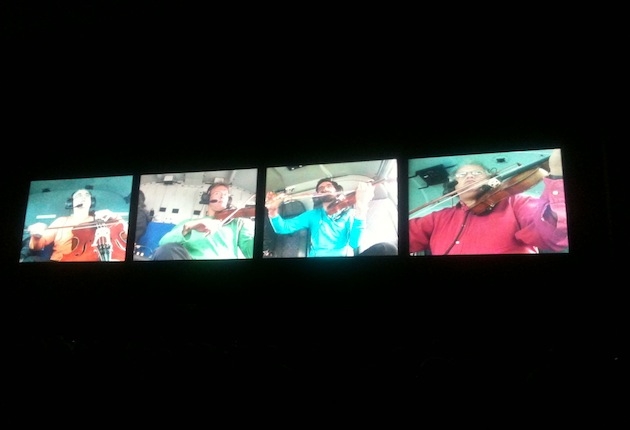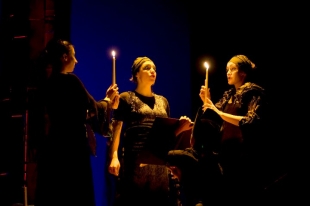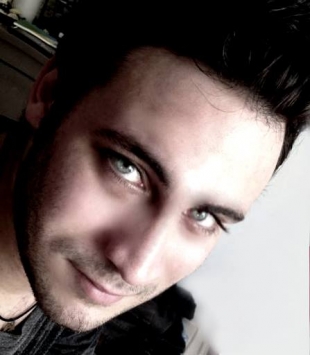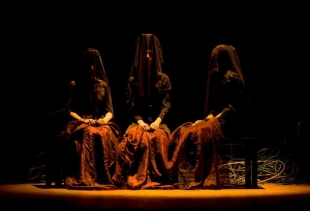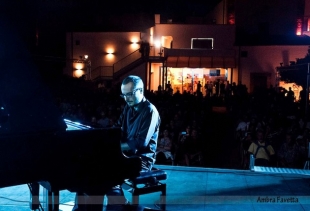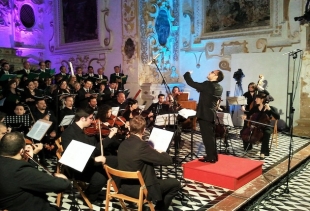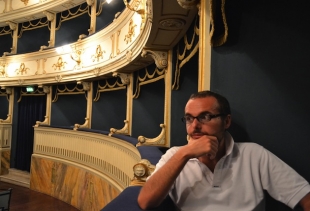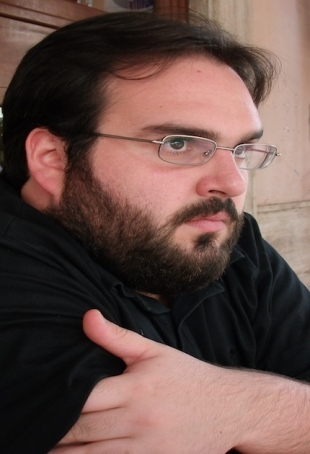» archive blog
-
Carnal, issue 0 of Parterre de Rois
A new magazine in Milandate: 18-07-2013
-
Interview with Nicola Toffolini
A worlds inventordate: 24-04-2011
-
Donne senza uomini.
Installazione multimediale di Shirin Neshatdate: 01-03-2011
Contemporary music and the professions: an interview to 3 young Italian composers
Music here and now, the elective instruments and the music training in Italy
Where are young generations of contemporary music composers in Italy? What they do and which kind of commissions and assignments they gain, above all are they satisfied of the cities where they work, of about their income and about the audience they have?
To discover all this, we went to the right place, in Venice, in the Fondazione La Biennale venue, an estate windowing Grand Canal, just in front of La Madonna della Salute and beside the fab Bauer Palazzo. In the old kitchens of Ca’ Giustinian mansion, we have met three of the four composers selected and awarded with master classes and with an entire opera production thanks to the framework of Biennale College program of the 57th Music Festival held last October: their operas (signed with a team of librettists, set designer and directors) of short duration (12 minutes), will be on stage during the 58th Music Festival entitled Limes, curated by Ivan Fedele (on October 4, 2014 at 8 pm, Teatro Piccolo Arsenale). The pièce has to be comic and will be accompanied by a music score for six elements.
Claudio Gay (Milan, 1988) is graduated at Milan Conservatory (piano and composition), then he studied in Bologna and dealt with music for movies. His opera for children Il Principe Granchio has been represented on 2009 at Dal Verme Theatre (Milan) while Le Sconfitte, of which he has been also the director, has been on stage the year after in Magenta and Lecco. Since this year he is composer in residence at Visby International Center of Composers in Gotland (Sweden). He has been selected at Biennale College with the design of the opera Tre cose (a caso) sull’amore (Claudio Gray music; Chiara Passaniti librettist; Laura Tassi director; Tommaso Sonaghi set designer): he, she and the therapist - a love affair observed by a third part.
Accursio Antonio Cortese (Castelvetrano, 1980) graduated at Palermo Conservatory. He also studied composition at Accademia Santa Cecilia (Rome) with Ivan Fedele. Then he studied music for movies and with Giorgio Battistelli at Accademia Chighiana, Siena (Italy). He also approached jazz music with several workshops. He composed symphonic, chamber, sacred, lyric and cinema music. He is organist for a church located in Sciacca, Sicily, and has been the artistic director of Sciacca Jazz (2005-2008). Until 2011 he directed the polyphonic choir of Terme di Sciacca and the chamber orchestra V. Bellini (Palermo). Cortese has been selected at Biennale College with the design of the opera O-X-A- (Accursio Cortese composition; Orlando di Marca librettist and director; Isabella Terruso set designer) where the sign “per” recalls, beside the youngsters slangs, the cross that the puparo uses to move his pupi in the Sicilian Opera dei Pupi while the letters O and A the two main characters, Orlando and Angelica, who will be first pupi and then the masks of Commedia dell’Arte.
Gabriele Cosmi (Oristano, 1988) after being graduated at Cagliari Conservatory, studied at the Milan one with Alessandro Solbiati and then at Accademia di Santa Cecilia with Ivan Fedele. He also studied electronic music with Elio Martusciello and Giovanni Cospito. He composed for ensemble, solo, electronic and orchestra and his music has been plaid in several Italian and European cities. His composition Cipressi gained the Honour Mention at Concorso Internazionale della Galleria d’Arte Moderna (Milan) and on 2013 his composition Geghard II for solo flute and ensemble has been finalist at Prix de Composition del Concours International de Genève. His music has been performed by Laura Catrani, Maria Grazia Bellocchio, Michael Wenderberg, Plurimo Ensemble, Ensemble Contrechamps, London Sinfonietta. He has been selected at Biennale College with the design of MagenZeit Opera (Gabriele Cosmi music; Diego Zannoni librettist; Alberto Oliva director): a generational struggle between an overweight mother and her anorexic daughter on the vague of Weimer Zeitoper.
Education and training. In your field you start earlier and so it seems you start also earlier to work. Which relation do you have with early years in contemporary music? Which kind of economic reward arrives from your profession? Which relation do you have with your elective city, the one where you’ve moved the first steps and the one you destined to the further ones if different from the first? What do you think of the Biennale College call you’ve won?
Claudio Gay: One of the most meaningful experiences of musical theatre (my preferred one) is that a playing instrument is here and now. I come from Milan where the study of composition is very elitist and is usually done at Conservatory, while I believe that in this as in other artistic disciplines you learn better and more on the ground, by putting yourself through people often driven by the same mental and artistic analogies. So, for me, the real learning starts after, when you’re out from the Conservatory and you detach yourself from teachers: then you start to learn. As composer, my relation with Milan and with this kind of knowledge is controversial, as you might see. In Sweden, for example, I discovered many realties and languages that are different from mine that I always pursue to meet anytime I can. Especially for languages, even when unfit for composition, are enriching and enhancing. Is Milano the best place in Italy for what I do? Italy, in general, does not offer too much for music even if any artist has to be clever to be able to reinvent himself all the times (in any field, so) and therefore the possibilities could be present anywhere, but if I have to answer in depth, the parallel on how the profession of composer is treated here and abroad is embarrassing.
To gain money in Italy with what I do is a real big word, we could mean that, if all goes well, I can recover my costs. And then, to find precious occasions as the one I’ve found in Sweden, a residence for composers, is very hard in our country. When I’ve read this call for entries, I found it immediately great: I meanly deal with opera, composition in Italy is seen as something at the last stage of “food chain” because is the most mistreated….The thing warmed me up a lot and has been the chance to work on a project that is not a mere award for composers but a team proposition including set designer, librettist and director for a real production that will go on stage. It is fantastic, because the young composers nowadays are in the trend to be ghettoized, the typical image I have of a same age composer is being alone in his room with the computer to champion sounds in the dark, on the contrary the collaboration with more hands and more heads is a wonderful way to issue musical theatre.
Accursio Cortese: The profession I do has been coming as a destiny: my grandfather has been a musician, band director and multi-instrumentalist; the cousins from both my mother and my father families are musicians and so, since I was a child, I’ve been immersed in this field. More on, I live in a land (Sicily) that is marvellous from many viewpoints but also ugly from others and there are lots of distractions…
After the school (Liceo Classico), I decided to be at Conservatory (before then, I’ve been keyboarder in many cover bands, pop music, arrangements, I was also songwriter) and being intrigued with music (with the M in caps, if so we can define it), I tried to give an orthodox flavour to my training, then – step by step – I came until here….
I have been informed about this call for proposals for Biennale College and I immediately catch the occasion because Italy and its theatres offer zero opportunities of this kind for young composers, when on the contrary it would have been the other way around: young people mean future and incentives have to be given to them. Such a brilliant opportunity as College will not happen again and we immediately got it. We have also been so lucky to have been selected.
The precocious start of our carriers is inversely proportional to our earnings, in Italy the composers able to live only with the music they write are less than the fingers of only one hand. I speak of already affirmed artists, big names. Me, personally not: I cannot survive only with what I earn with the composition, with assignments and commissions, I do not have this power and do not know if I will have it one day. In any case in Italy (and I underline it: in Italy) this is so hard.
Are you happy with the choice of Palermo as your elective city for creation?
I am grateful and I do not like to bite the hand that feeds me: Palermo is the city where I had my first training and is also where I had my first commissions from orchestras and also executions in symphonic calendars. Yes, if you would like to say “are you happy to be in Palermo because you can work well there?”, unfortunately the answer is negative because I am not be able to work well. As in other places in Italy, even if Rome or Milan offers more than my city because there only two orchestras are active (both are risking to close, one because of compulsory administration and the other’s budget is shrinking), so your answer is now complete. But if we only complain, we contribute to the disaster even if we’ve not caused it. How our politicians can be happy if they would earn less than their 35.000 euro per month?
You have also deep experience of jazz (not only in training but in doing it) and you are organist. How do you manage to let these plural souls to work together and do you think that unconventional venues can help contemporary music scene to involve more audience?
I was not getting closer to different sources of music to shake them in a cocktail or to ham them up in a musical path – simply because I’ve never make distinctions over genres, for me there is only music of quality, good music or bad one. If I’ve been commissioned to write entertaining music, for instance, I can only make it well or bad. Living in a world where there is a plurality of tastes and genres, a composer must open up windows and see what is out there but this then cannot ultimately mean that you’ve to make of this a poetics or a style signature. Jazz as standard, à la Miles Davis to understand each other, is dead with these masters: it seems to me more interesting to filter (with our own background) which were the rhythmic, improvisational and linguistic lessons the jazz has given. Let’s see Dvorak or Debussy (with Ragtime) or Stravinsky…At the very end, contaminations have been always existed. I open the mind to the more eclectic experiences that then are filtered in my idea of music. That is the only one we can communicate.
Gabriele Cosmi: I was born in Sardinia and live in Milan since only three years, so I got my first degree at Cagliari Conservatory and while there I took some master classes with composers such as Kaija Saariaho, Stefano Gervasoni and others. Then I decided to move in Milan. A boy starting with piano at 18 years will be always out from the concert carrier. While for a composer, the starting age is higher because is hard that a child can be intrigued by composition, you need maturity in thinking as an adult. I started very early because I finished my three-years first degree at 21 and I’m finishing the second one (two years) now. I was quite often studying with older colleagues. Regarding profits, in my case it is untimely to speak about it because also an architect will not be able to earn a big salary at this age!
I think that Milano is the more interesting Italian city to live with music. I do not think there are others to be paralleled with it. If I would look around and abroad, I would be happy to being admitted for a PHd in US!
What do you think about creation? Which is your approach? Do you have first prepared your idea and then, with that in the hand, have looked for a librettist and a director or….
CG: I also deal with theatre beside music and so I collaborate since several years with the director and the set designer I selected for the Venice call. The librettist has been onboard via a contact with the set designer and our minds immediately matched! She indeed is graduated at Paolo Grassi Academy as author and this is very seminal, we did not asked her a libretto but a theatrical text on which work all together.
Tre Cose a Caso sull’Amore is therefore being developed on a truly collaborative base. We have already performed prose (every time has been possible because paid: for instance in Milan, in Rome at Teatro Manhattan, to Teatro Lirico in Magenta). We all struggle to mainly work in Milan because we want to change the world of opera that is made there and, as a consequence, we would aim to change also the audience (that in Milan is made of a lot of old fur-dressed women plus very few young people). To sensitize the city is our mission, obviously in the limits of what can be done.
AC: O-X-A is an apparent jump in the past, we take inspiration from what is a mankind patrimony (the Sicilian opera dei pupi) that is subjected to a change, revealed on stage (our pièce will be full of surprises). The pupi are not the usual armoured puppets, they will be a metaphor telling something else. Some styles will be as the Sicilian way to set the pupi because it helps from an aesthetical viewpoint the opera but our work will not stand as a translation of opera dei pupi in the opera buffa world. The puparo (the puppets’ holder in the opera dei pupi) will be a performer that will act the puppets only in a metaphorical way. The puparo is also a cuntista in this traditional form of theatre, literally the one who tells. But, in our case, the real storytellers will be the pupi who are traditionally silent wooden objects moved by the cuntista.
I’ve never considered opera music as absolute (as the camera and the symphonic ones are) but as an applied gesture: as the one written for the cinema or for the theatre, it has to serve the narration (a libretto) and the drama set. In my case, I so have had an idea and the librettist has to find the way to realize it but me, another time, have, as composer, again served the text of the libretto when ready and tried to make it clearer, more homogeneous and the most continuous possible. In this sense we are working together and very well, from the professional side we are all young Sicilian and so we shal bring a small amount of our imprinting (by not remaining jailed in our holography).
GC: MagenZeit Opera is a pun, we put on stage a surreal and bitter laugh. In relation to my colleagues composers who are moving toward the comic genre, for me to write a comic music has been impossible since the beginning. The comic I’d always loved is the one arising from intelligence given by exchange of dialogues in which some behaviours are playing a role - as religion, bohemian ways, intimacies. I mean a kind of irony à la Calvino or à la Beckett, for instance. To obtain this kind of results is necessary to pass through literature. In music this is impossible to gain. Music is a self-referential language; it speaks only of sounds with sounds and of nothing more. This side is also pertaining to opera music even if there you have actors and singers. I like to think to its abstract dimension: something on the edge between a real dimension and a fantastic one. I like to have an ambiguous relation between the meaning and the form conveying that meaning in the action on scene. So music is not intended as a comment to drama but is the virtual place that surrounds the action.
As composer, I was wishing to have the strongest rigour inside the opera. A lot of technical issues were trapping me; I had to find a virtuous tool to sum up music, voices, the electronics and the direction and a text and to find the meaning of each of these components in order to formalize them with coherence. To give you an example, the spatialisation of the sound embodies a crucial role as the one of the act of the soprano and as the movements of the characters on stage: this because I need to characterize the human complexity of the characters at its best (this is the same of the mankind). So, this is my idea of theatre in short.
The relation with my colleagues has been founded in the same time the project started. The preliminary meetings, very nice, have been dedicated to understandings and to search a common musical and theatrical ground with my musical tips to them (operas as Perelà by Pascal Dusapin) and their theatre pieces tips to me (that have been added to a lot of readings about theatre, as Beckett and Ionesco).
I like very much to be alone when I compose music, it deals with abstraction and concentration. I always feared of teamed works. We so met for this call of proposal, when I discovered Biennale College I felt not ready for (the risk of fiasco is very high). So at 5 am I sent an email to a young director and I was happy he accepted because he is one of the best of his generation, then he found the other two professionals we’re needing. Now we are very well teamed up and, apart this project, we will surely go on to work together.
Do you think that the form of opera buffa, of comic play lasting only 12 minutes will bring more audience in festivals devoted to contemporary music because ….the shortage of public is undeniable…
CG: I do not think that to issue comic plays is the definitive answer to bring more public but why not, all the pathways have to be run. Duration? The choice of the 12 minutes indeed is not intended to bring more public but from the fact that we’ll be represented all together in a single performance night and people cannot stay so long in a theatre. Then, I see a psychotic note in contemporary music with abyssal durations that for sure are not helping the fruition.
GC: Rather than to answer to your question I would love to open up a bit the discourse. I often find that programming in contemporary music is not adequate. When I drive my students to listen contemporary music (by carefully choosing composers, for example, born in the ‘50ies), I always gain surprising results, they’re astonished. Their amazement arises from the fact that they were not imagining that there is a so touching and expressive contemporary music. I only quote some masters who I found were always well welcomed by the not expert audience: Alessandro Solbiati, Luca Francesconi, Ivan Fedele, Stefano Gervasoni, or Pascal Dusapin. By programming these authors is impossible to stay untouched or do not go to listen. But for sure not only with these ones, the list could be very long, also some names from the more difficult avant-garde some masterpieces can be found, think for instance to Ligeti. While, in Italy, I found big confusion on what means programming for a season and for a festival. They have very different needs. I can admit a very audacious festival (that put on stage something new with a shocking aptitude) but I cannot understand to build a cast of absurdities in an opera season because there is the place where to find confirmations. The fact that theatres are always hosting absolute premieres and not repertoire of nowadays tells to me a lot: this means that the critical conscience of curators is very arguable. When you see a work of 900 or of today in the season, it seems that you’ve been forced to schedule it and not because you like to offer a masterpiece to your paying subscribers! I would love to find reasoned and selected programming able also to research and to find beauty: in this way theatre halls will be fully booked.
All of us is listening Beethoven and we always scream “bravo” for his symphonies or for the quartets or for the sonata. This is natural. But I bear that we would be less enthusiast of his choirs, so not all that has been produced before ‘900 is so spectacular. Music has been filtered to preserve only a thin slice of it. If we ask the listener to make a list of composers he likes, how many we will find in it? 10, 20? It is natural that in 2013 years of music history we have had much more composers. So I would love to unmask the statement that music stops to be communicative after 1900 and that only before we have the masterpieces.
Which is the relation with your preferred instrument and the composition?
CG: I hate to write for piano, anyway when I compose I try to detach my executor soul. I wrote very few music for piano and when happened, it has been only for camera ensemble.
GC: I am not an executor, I never dealt with playing.
How the master classes have influenced you in putting or taking out parts of our opera? On the contrary, is this experience being able to confirm in toto your design and your creative ideas?
CG: Many enlightenments have occurred, as with Giuliano Corti and his class on drama structure and on the variety of writings for music. Or about the role of canto in the contemporary music and of the vocal gestures, we’ve seen crucial examples in partitions and after this I cannot say I will radically modify my design but I will take surely this in account for it!
GC: It has been beautiful the fact of being in relation. Especially with Giuliano Conti and his contribution about the libretto writing and with Cauteruccio on the theatrical direction. I do not feel to have to operate big changes but I surely got positive reflections that will lead my team to review the job already done!
Limes - instant reviews
The biggest surprise of Limes has been the mise en scene of the four pocket operas (the definition is of one of its directors) that Music Biennial produced starting from the educational program Biennale College (and also mastered on cd within the occasion of the sold out premiere the last October 4th).
Really mature works, the operas have all been widely contemporary and translated a very fertile and promising artistic scene made of young composers, directors, set and costume designers (to do not mention the libretto-writers), where predominating are new languages taken from the visual art – enriched by the multitasking qualities owned by each member of the teams, singers first.
O X A is maybe the most classical of the four as set design and characters distribution but it surprises for its stunning (and never didactic) use of performance (thanks to the dancer Paolo Cutuli).
Magen Zeit Opera hazards more than the others on the composition scheme even if is recurring to a standard of German opera theatre. The team operated a very keen choice of the singers (very good the one starring as Ellie, she is also a very good dancer and actor). It is the libretto here to win over all the ingredients (curated by Michelangelo Zeno): it is the skeleton for the whole music and also won many applauses and an incredible amount of laughter. It also points and support well the brave choice of set and costume designer Marco Ferrara as well as of the director Alberto Oliva.
The Myth of Homo Rudolfensis, composer the Israeli Yair Klartag (libretto Yael Sherill, director Franziska Guggenbichler, costume design Aileen Klein), maybe dared more in aesthetical and artistic terms. First, it is the only one to have really respected the duration of the comical opera, 12 minutes: singers were often singing the flow of the time on the scene. But it is also the sole opera to have found the trick to be always “on the spot”, by also driving constantly the attention on it from the other pieces. A gorilla, starred by Fritz Faust, was sitting among the public and was strolling around during each interval. When the Israeli opera ended, it climbed on the stage and closed it.
The four operas are on the market now, because they are complete and well packed products, Biennale still has to take decisions on it. The sure data is that they’re not the only production that Biennale afforded this year through Limes. For instance, on October 6th, on Italian premiere, there has been another Israeli composition (by Eduard Hamel, 1986): a very interesting, intense and touching partition holding in it lots of fractions and unusual movements, speaking of recalls. On October 8th another world premiere (this time in collaboration with the Dance sector): Indigene – music by Giovanni Dario Manzini (1978) and choreography by Virgilio Sieni. Also for the Ensemble Intercontemporain on scene on October 11th at Corderie, there is a world premiere, produced by the Biennale (Iridescend Stasis), composer Amir Shipilman (1980)
Over more than 55 among compositions (longer or shorter) that are in majority Italian premiere, operas, complex performances and a movie (about L’Aquila earthquake) that this Biennial of Music dedicated to borders and to the far away musical traditions, there is also another world premiere (also produced by Biennale Foundation), that ends the festival on October 12 at Corderie (8 pm): Katër i Radës - Il naufragio a camera opera with music written by Admir Shkurtaj (1969), libretto by Alessandro Leogrande (taken by the Italian novel-reportage Il naufragio, Feltrinelli 2011), the direction is by Salvatore Tramacere.

